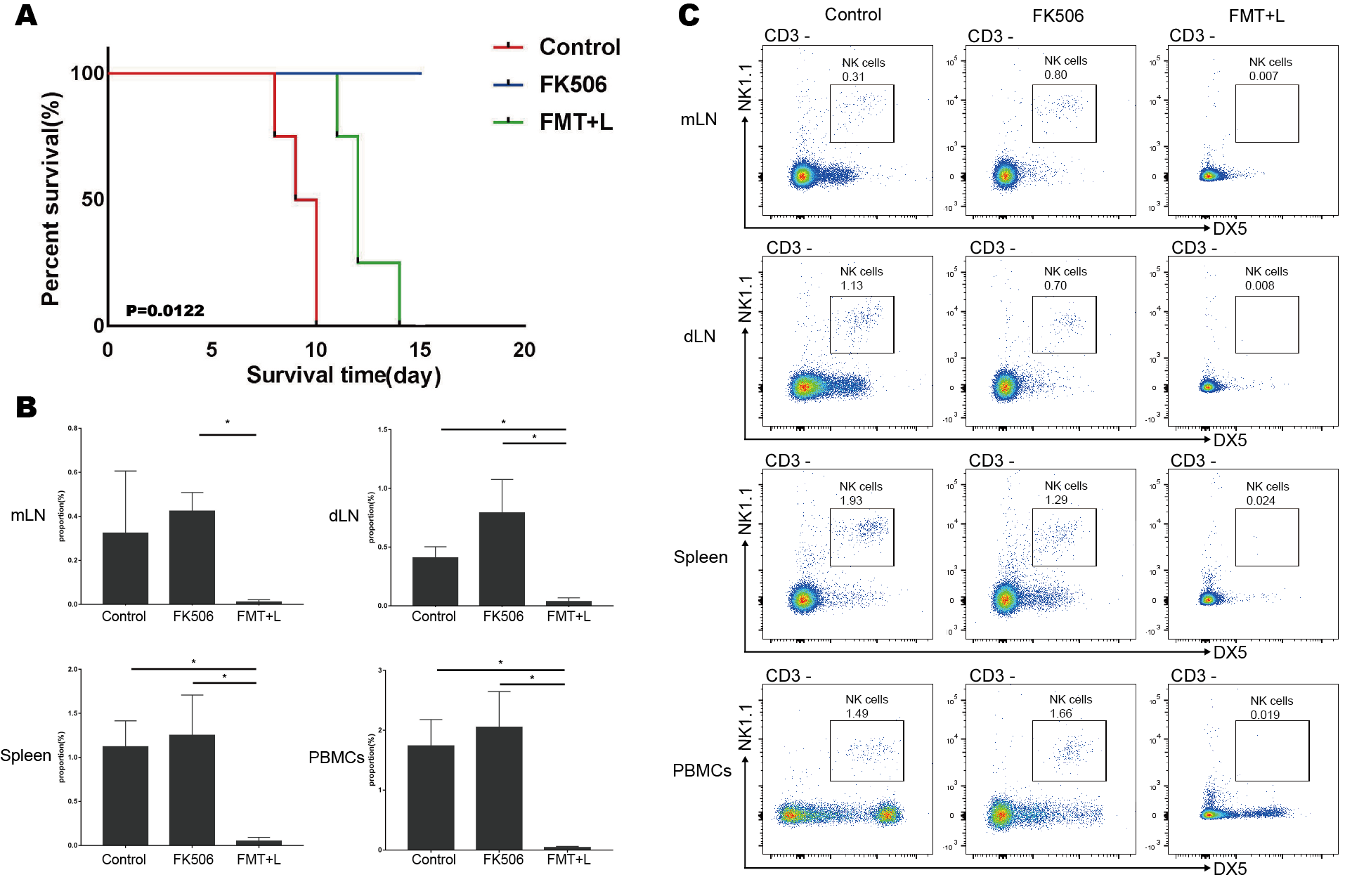Specific Gut Microbiota Community Suppresses Acute Rejection by Reducing Natural Killer Cell Population
Department of Urology, Capital Medical University Beijing Chaoyang Hospital, Urology Institute of Capital Medical University, Beijing, China
Meeting: 2020 American Transplant Congress
Abstract number: B-333
Keywords: FK506, Graft survival, Natural killer cells, Rejection
Session Information
Session Name: Poster Session B: Acute Rejection
Session Type: Poster Session
Date: Saturday, May 30, 2020
Session Time: 3:15pm-4:00pm
 Presentation Time: 3:30pm-4:00pm
Presentation Time: 3:30pm-4:00pm
Location: Virtual
*Purpose: The gut microbiota community was reported to be altered by high-dose FK506 treatment, while fecal microbiota transplantation with such microbiota plus low-dose FK506 could prolong the survival of allograft skin in our previous study. Nonetheless, the involved immune cells in this phenomenon were still unclear. Natural killer (NK) cells have been considered as participants in alloimmune responses of graft damage as a synergy to the functions of adaptive immune cells. In this article, we investigated the proportions of NK cells in various tissues of mice skin transplantation model with fecal microbiota transplantation and low-dose FK506 to determine the roles of NK cells in acute rejection.
*Methods: Skin transplantation was performed. BALB/c mice were used as skin donors and C57BL6 mice were used as recipients. High-dose FK506 group (n=4) was given 10mg/kg·d of FK506 by gavage as feces donors; FK506 group (n=4) was given 1mg/kg·d of FK506 after skin transplantation; fecal microbiota transplant plus low-dose FK506 group(FMT+L group)(n=4) was given 0.1mg/kg·d of FK506 plus 10ml/kg·d of fresh feces from High-dose FK506 group (1g resuspended in 8 ml of sterile water, no FK506 left) after skin transplantation; control group (n=4) was treated with equivalent saline after operation. The survival rate of allograft skin was recorded. Flow cytometry was used to characterize NK cells (CD3–NK1.1+CD49b+) in mesenteric lymph nodes(mLN), allograft skin draining lymph nodes(dLN), spleen and peripheral blood mononuclear cells (PBMCs) 7 days after transplant operation .
*Results: The combination of fecal microbiota transplantation and low-dose FK506 prolonged allograft skin survival by 2.25 days compared with control group(P<0.05) but this treatment didn’t change the graft fate of death (Figure A). Flow cytometry showed the proportions of CD3–NK1.1+CD49b+ NK cells in mLN, dLN, spleen, and PBMCs are significantly decreased in FMT+L group, whereas there is no obvious difference of NK cells between FK506 group and control group (Figure B and C).
*Conclusions: According to these findings, the specific gut microbiota community plus low-dose FK506 treatment reduced the proportions of NK cells in various tissues in mice after skin transplantation, which may ameliorate acute reject effects related to NK cells and prolong the survival of the allograft skin.
To cite this abstract in AMA style:
Zhang W, Gong L, Xu Y, Hu X. Specific Gut Microbiota Community Suppresses Acute Rejection by Reducing Natural Killer Cell Population [abstract]. Am J Transplant. 2020; 20 (suppl 3). https://atcmeetingabstracts.com/abstract/specific-gut-microbiota-community-suppresses-acute-rejection-by-reducing-natural-killer-cell-population/. Accessed July 6, 2025.« Back to 2020 American Transplant Congress

